
5 AI-Powered Workflows Every SEO Should Be Using Today
The Dawn of a New Era: Building Solutions with AI
Vibe Coding, vibe marketing, agentic AI solutions, "woozle wozzle"...Wait, that last term isn't part of the latest hype around AI, but if you've been hanging out on either LinkedIn or Twitter (sorry, I can’t call it X), you've mostly likely seen marketers deploy a wide range of fanciful toolsets and AI-integrated workflows.
With LLMs becoming savvier and faster, marketing teams have immense untapped potential to automate routine tasks, enhance existing workflows, and arm their most creative individuals with new superpowers. Knowing that there's no limit to one's imagination when building AI products, my curiosity was piqued when I saw people sharing workflows using Relevance AI, a cutting-edge AI agentic workforce platform. At Moz, we've been enhancing our SEO API data product over the last year, improving existing data solutions and introducing new endpoints for all digital marketers. What would happen if we connected the API to an AI workforce platform?
Moz + Relevance AI's Secret Weapon for Marketers
The result was a fleet of intelligent SEO agents powered by Moz's trusted API data and Relevance AI's flexible and powerful platform. From content refresh recommendations to backlink prospecting workflows, we created solutions that automate manual tasks, initiate research tasks in the background, and provide a strategic output that can propel your marketing efforts to new heights. With all that said, let's dig in and review the 5 AI-powered workflows every SEO should be using:
Author's Note: You will need a Moz API subscription (starting at $5) and a Relevance AI account ($19/mo for 10,000 monthly credits). You can always try the free product for both, but your tasks will be limited in scope.
Additionally, you can download the Relevance AI guide for these agents, which outlines the models used for each agent. All agent templates currently use GPT-4o Mini or Gemini 2.0 Flash. For the best results, you can use Claude 4 as the primary model for these agents.
Bonus: There's a sixth agent named Billie, the SEO Blog Post Outliner, to help you develop comprehensive and optimized outlines for individual blog posts!
1. Reva – The SEO Content Refresh Strategist
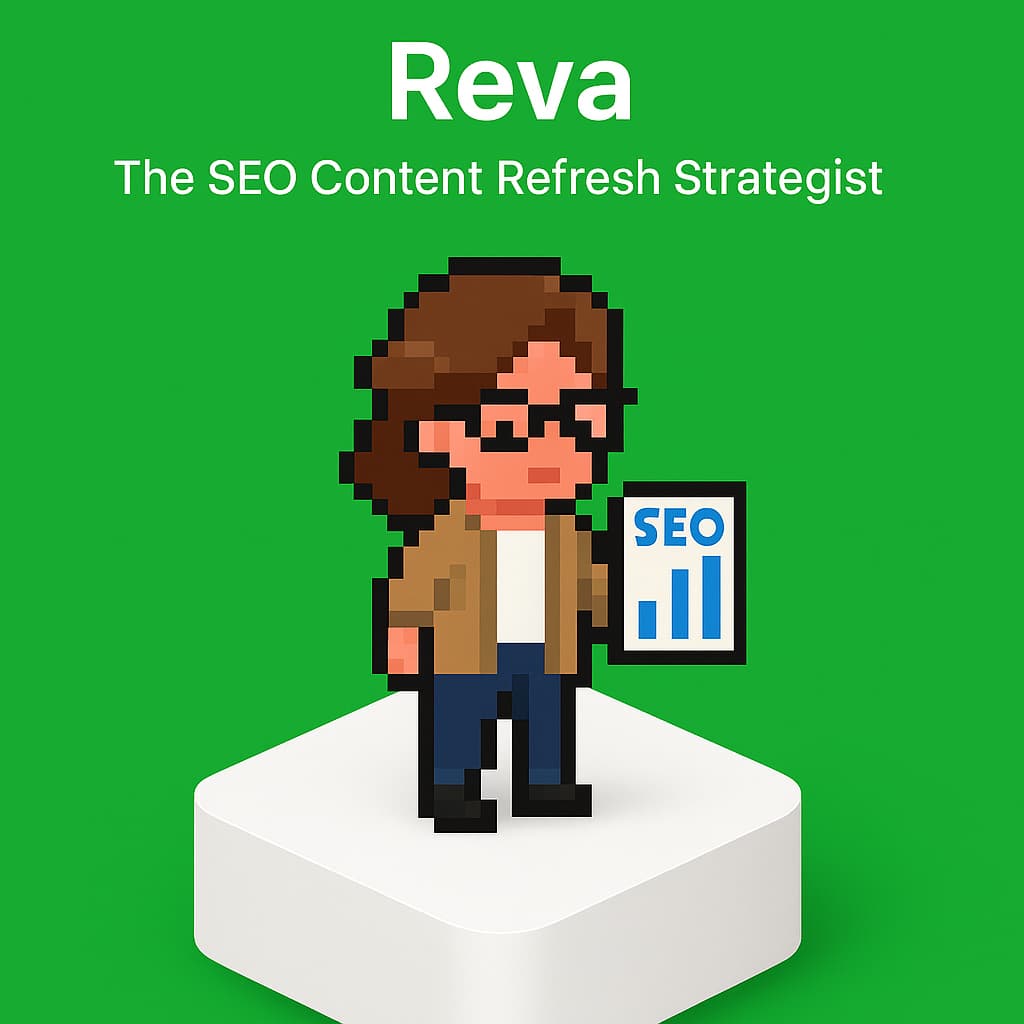
Reva's Mission: Analyze existing website pages and create data-driven content refresh strategies. Using a blend of keyword metrics, search intent analysis, and content evaluation, Reva suggests strategic content updates focused on improving the quality of your content and increasing rankings.
Moz API Endpoints Behind the Scenes
Fuel your insights with real-time SEO data
from Moz API
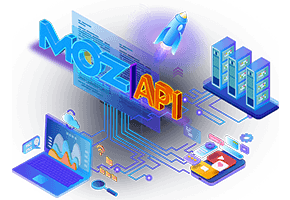
What Reva Generates
- Content Audit Summary: An overall summary of your page's performance relative to your primary keyword, including the current ranking position, search intent, content strengths, and content weaknesses.
- Keyword Performance: You will receive metrics related to this page's primary keyword performance. Reva will also provide additional keywords for which your page is ranking and additional opportunities related to your niche.
- Content Gap Table: A breakdown of sections your competitors have but your page lacks, including quotes, examples, and specific frameworks.
- Detailed Content Recommendations: Tactical advice on beefing up your content with explicit examples for each section. Reva will illustrate the impact specific content sections have on competitor pages and how you can translate those findings into actionable tasks for your page.
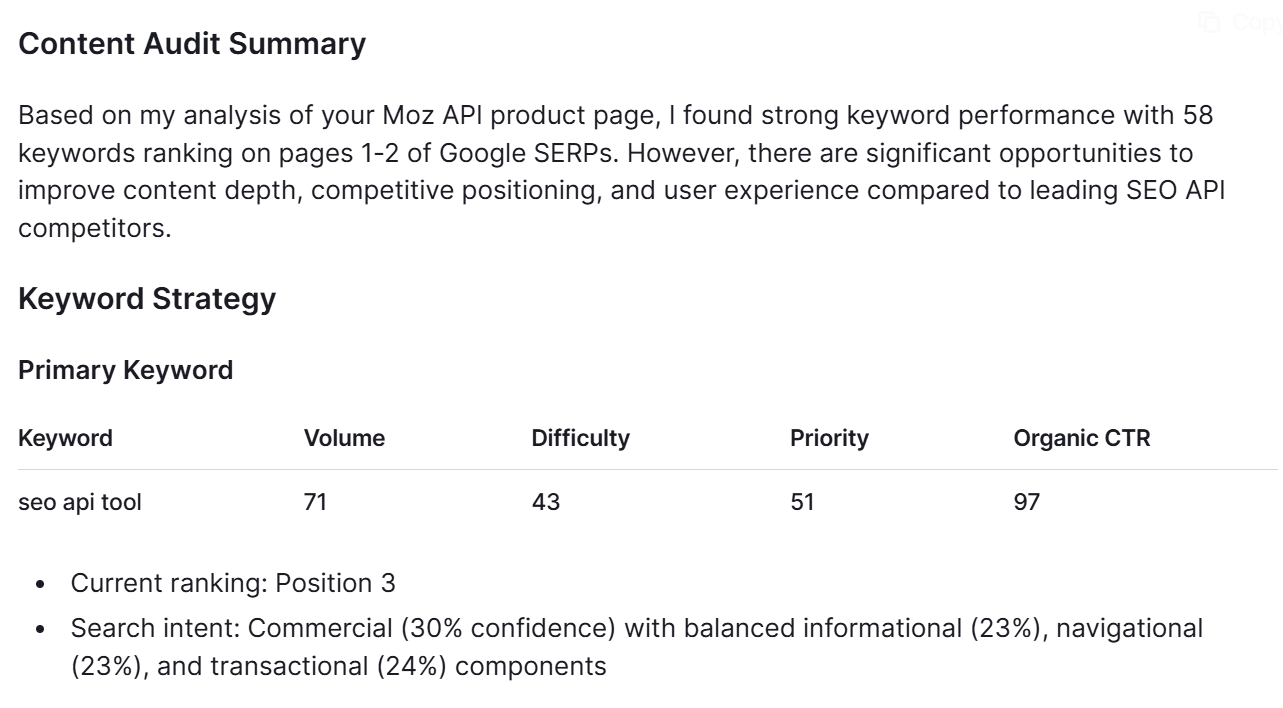
Reva analyzed our API Product page and gave some solid recommendations for non-branded search terms.
Benefits: Reva replaces hours of competitive research and combing through content with one single prompt. The final output is a strategic content refresh plan, allowing you to revive stale content and implement a plan to increase rankings for new keyword opportunities.
2. Kira – The SEO Competitor Keyword Analyzer
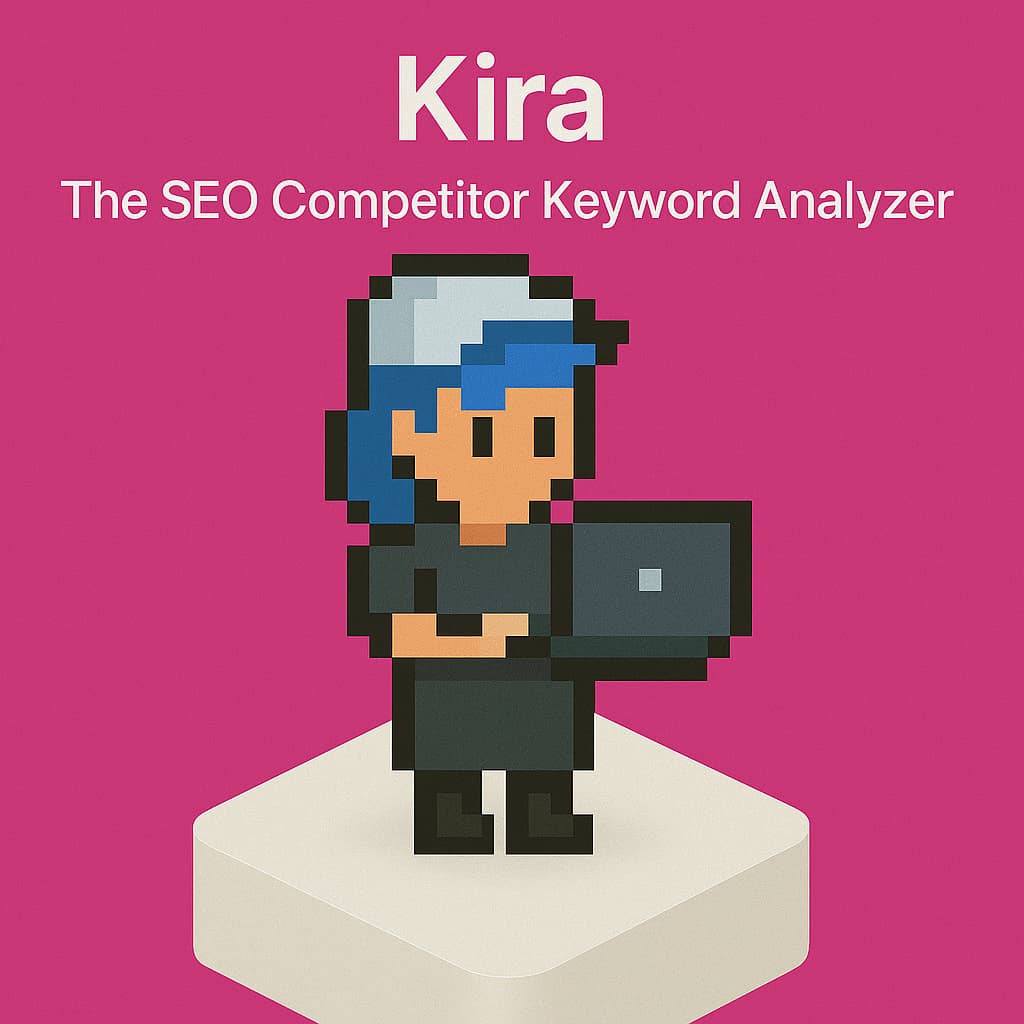
Kira's Mission: Discover which keywords your competitors are ranking for that could yield revenue potential for your website. The output provides a detailed analysis of competitors outranking you and where you can unearth gold long-term.
Moz API Endpoints Behind the Scenes
What Kira Generates
- Ranking Keyword Count Analysis: This will give you a snapshot of how your website compares to your specific competitors. The results will indicate whether you dominate the SERPs or lag behind your fiercest rivals.
- Ranking Keyword Metric Analysis: While knowing if you're beating your rivals on an overall number of keywords is comforting, Kira goes in-depth on what this means for your website by digging further into the details and highlighting winning keywords.
- Keyword Opportunities: The SEO landscape has shifted so much recently that algorithm updates, AI Overviews, and the proliferation of LLMs mean there's limited traffic to fight over on organic SERPs. With Kira's competitive analysis, you can get a list of each competitor's top 25 keywords to target, pertinent metrics, and the topic opportunity at play. Rather than wading through endless keyword metrics data, you also get a highlighted version of the top five main opportunities and the potential upside from optimizing for those specific topics.
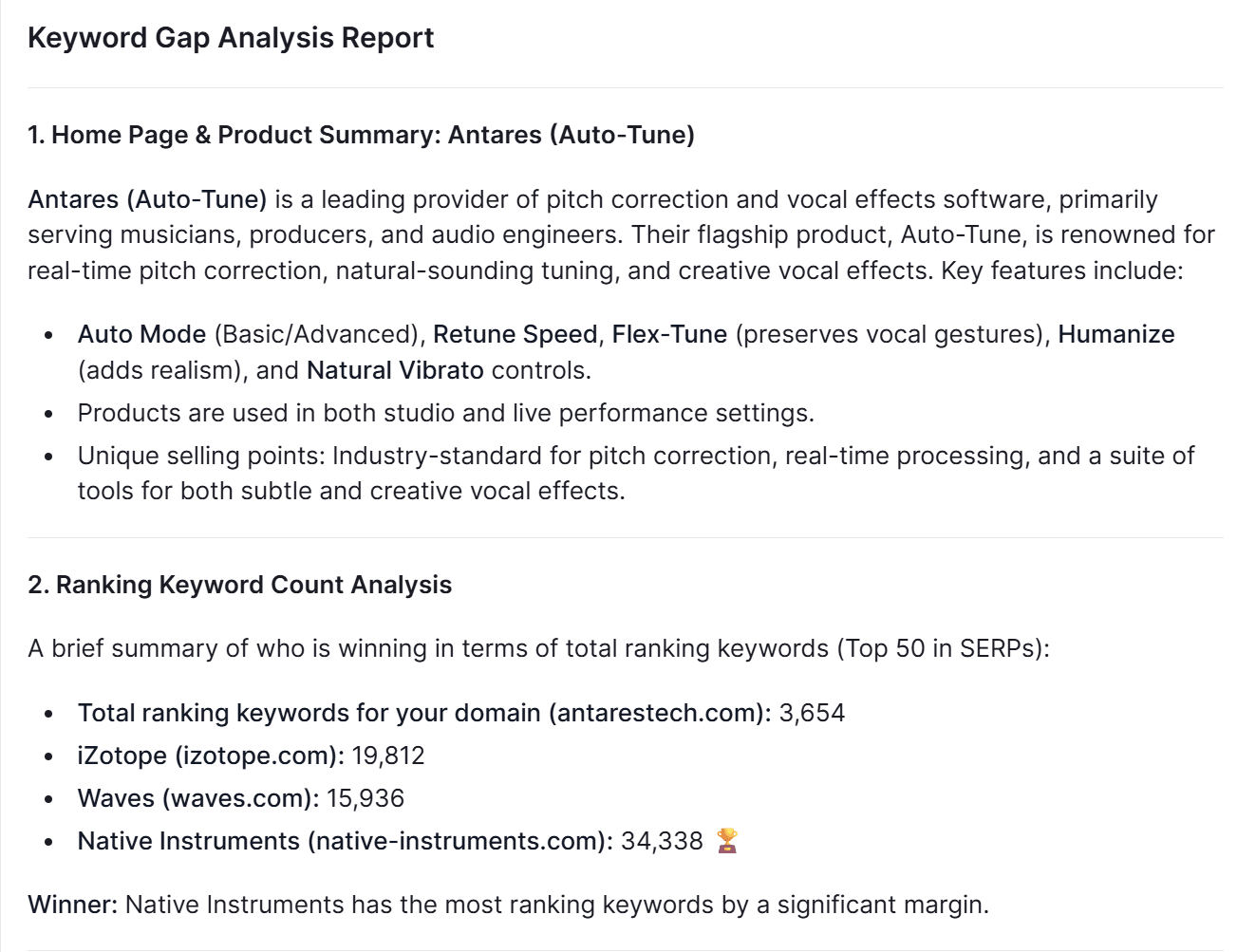
Kira's high-level analysis described the Antares website perfectly, illustrating a capacity to learn independently to understand the main unique selling points.
Benefits: Guesswork can only go so far when sizing up the competition. Kira's ability to analyze content and extract the most salient topics related to your website's target audience saves countless hours on competitive research that is better spent on user research and creating content hubs.
3. Linka – The SEO Backlink Prospector
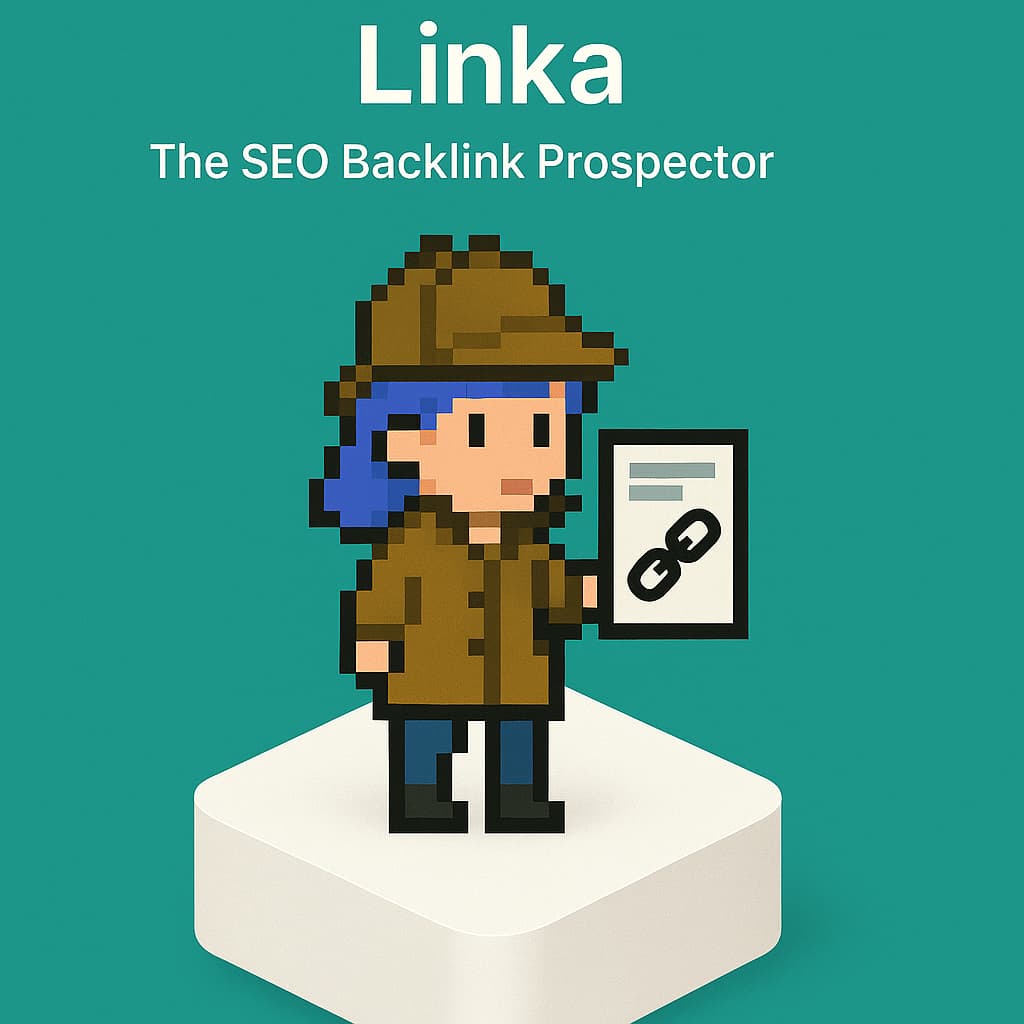
Linka's Mission: Discover and prioritize potential link building opportunities based on the content of your website and the popularity of brands on the web. Combining a digital sleuth with Moz's proprietary Brand Authority metric, don't get stuck reaching out to websites that won't move the needle on digital PR and link building initiatives.
Moz API Endpoints Behind the Scenes
What Linka Generates
- Initial Prospect Analysis: Using your chosen topic, target URL, and focus keywords, Linka will prepare a preliminary list of brands you can reach out to in a given niche. You'll get a top-level analysis of each prospect, including their publishing cadence, content quality, content relevance, and Brand Authority. Assessing content relevance and publishing cadence will prevent you from sifting through countless irrelevant websites, allowing you to focus on fruitful options instead.
- Customizable Outreach Templates: If you're a little shy or don't know how to craft impeccable outbound emails, fear not! Linka will prepare email templates that can be customized and, in some cases, identify relevant content to capture the recipient's attention. Note that you can customize as you see fit to avoid the spam filter.
Measure your Brand Authority with trusted metrics from Moz

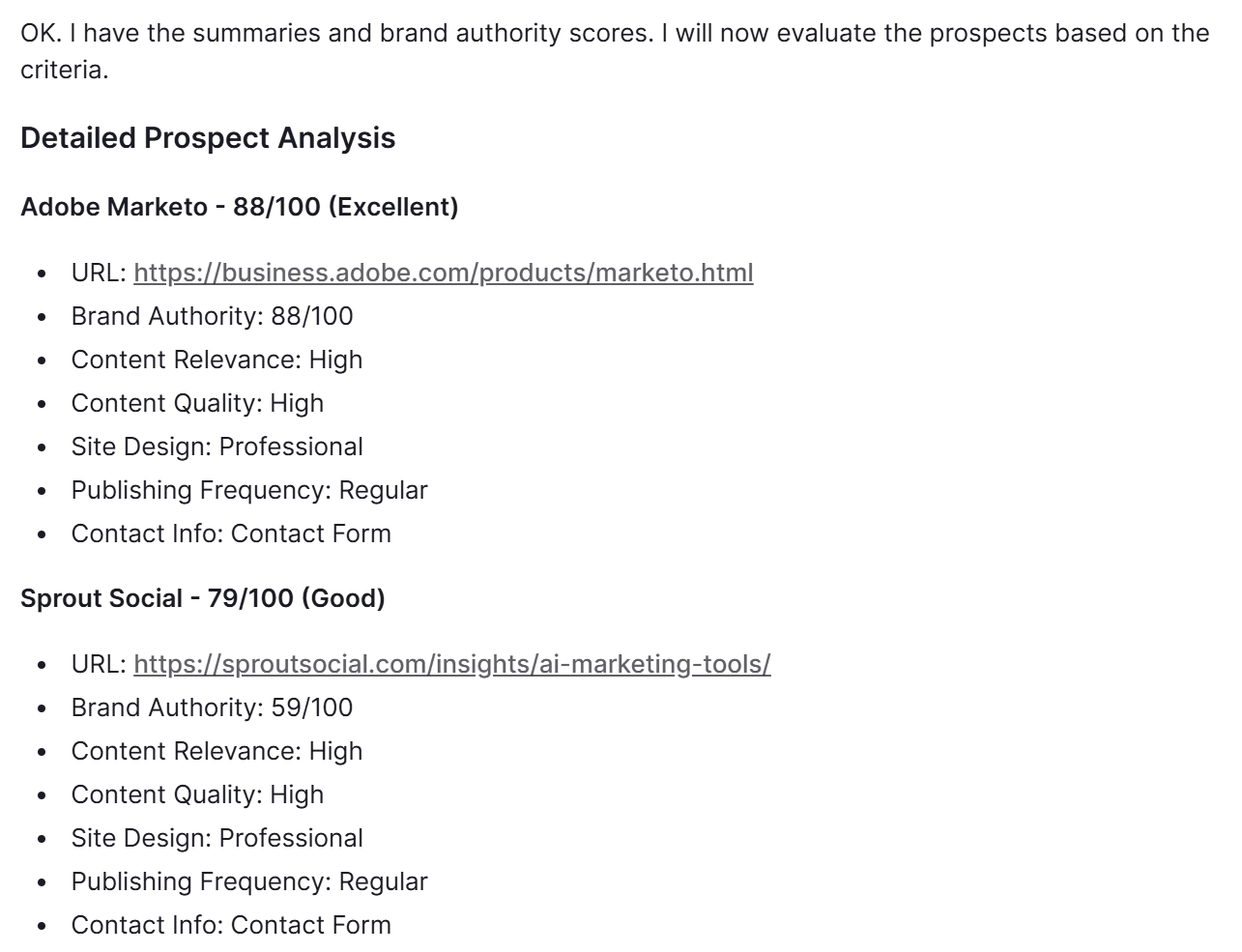
Linka will provide a list of prospects based on a minimum brand authority score. The lower the limit, the more opportunities you can find.
Benefits: While a slew of link building tools can help you identify a treasure trove of opportunities, this is a good option to get your feet wet and find some initial prospects. By leveraging Brand Authority in your research process, you can pivot your focus to leaders and well-known entities in your niche. Additionally, you can take this initial feedback and dive deeper into link research using various tools, such as Moz's Link Explorer.
4. Cora – The SEO Content Intent Optimizer
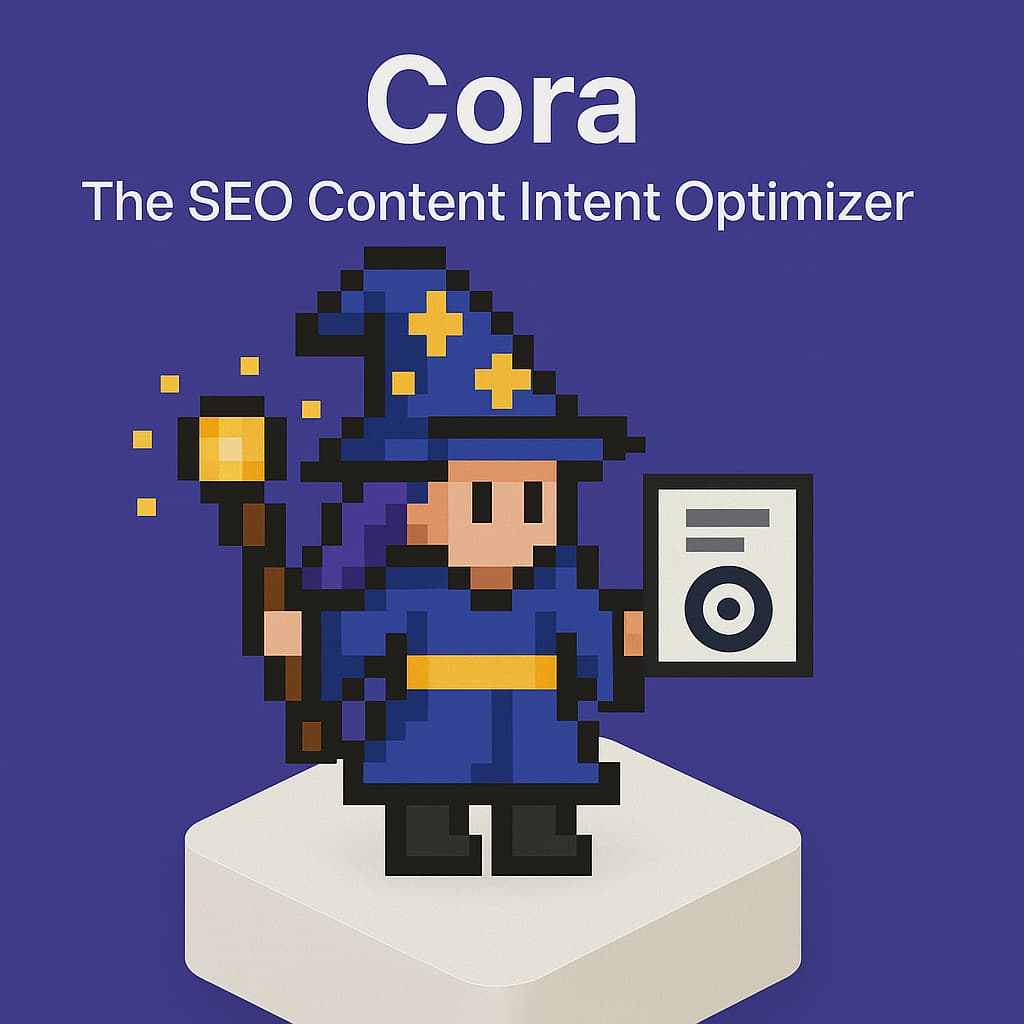
Cora's Mission: Do you ever get frustrated reading content you find via search engines that doesn’t align with your original intent? Fortunately, Cora can help you analyze your website content and keyword search intent patterns to identify potential misalignments. Get customized guidance to improve the conversion rates of your targeted pages based on the primary search intent of your main keywords.
Moz API Endpoints Behind the Scenes
What Cora Generates
- Intent Analysis Summary: By analyzing your targeted URL, Cora will provide a high-level view of your page's primary keyword ranking. Cora will then compare the dominant and secondary search intent patterns for your top-ranking keywords against the intent of your page's content. The final result, an intent alignment score, helps you understand if you've written well enough to target customers at the right customer journey stage.
- Content-Intent Gaps: Depending on how well your content aligns with your primary keywords' search intent, you'll get a recap of potential gaps within your existing page. Based on how much you need to refine your content structure, Cora will provide recommendations, such as reducing overly promotional language for an informational page or adjusting content to make your page more cohesive.
- Detailed Recommendations: If you're like me and would rather be overwhelmed by details, Cora provides a more in-depth list of suggestions to enrich your content. While surface-level recommendations are typical of AI tools, Cora provides customized ideas tailored to the search intent of your targeted keywords. You will receive a step-by-step action plan for the top five most consequential opportunities, including the themes you can weave into your content, interactive elements to enhance the UX, and concepts around social proof to strengthen your page.

Cora understood our approach to the Beginner's Guide to SEO perfectly, and it seems like we've done an excellent job aligning our content to informational searches.
Benefits: Optimizing for both search intent and query sub-intents will become more critical as the search landscape evolves. These recommendations are far superior to the rudimentary and vapid "just write more content" suggestion that tends to be at the top of one's mind when a page's performance suffers. Cora generates tactical feedback that makes your content desirable to search engines and LLMs. Oh, and users will love reading it, too.
5. Clara – The SEO Content Cluster Planner
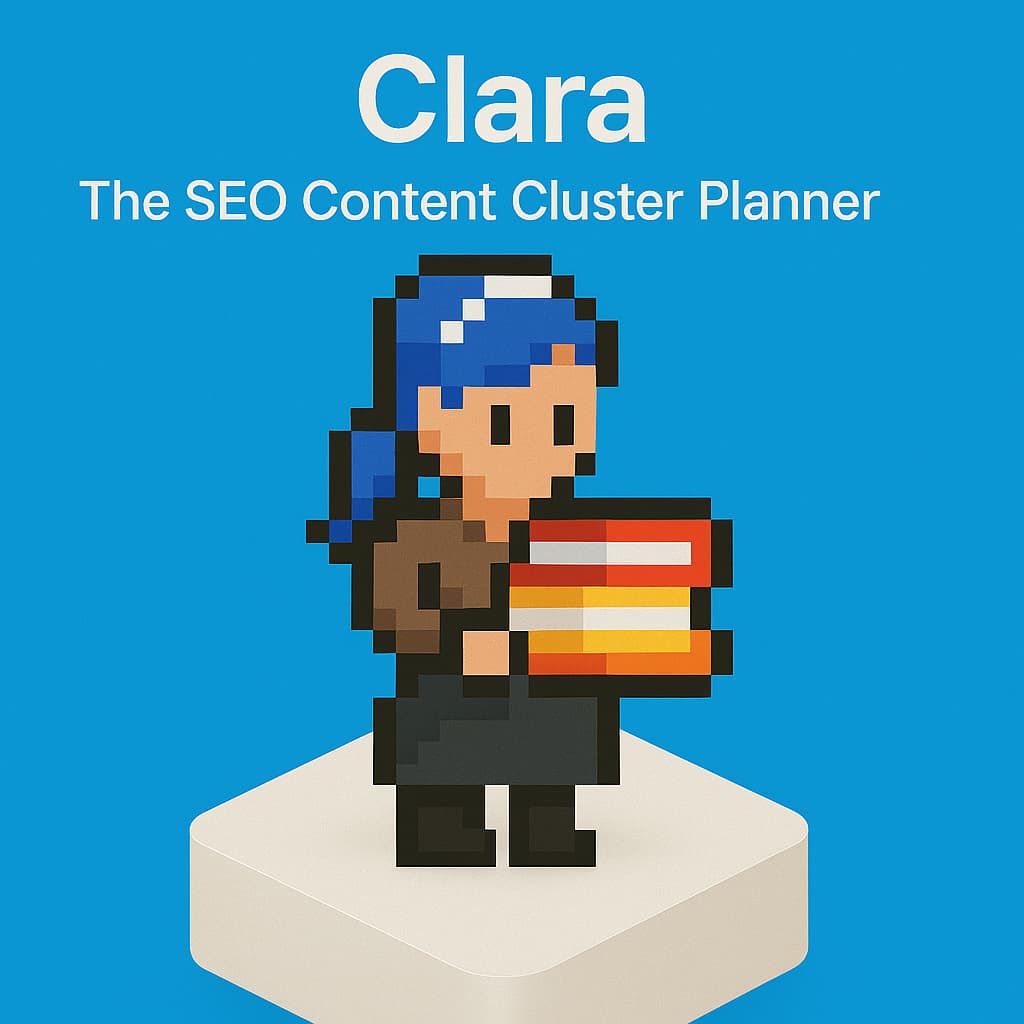
Clara's Mission: Possibly the hidden gem in this fleet of super AI agents, Clara can help you create a hub-and-spoke content marketing strategy to ensure you have topical depth on the subjects that matter most to your target audience. If you feel your content has little substance and a conspicuous lack of coverage on your website, Clara will help you build a content cluster approach for net new content.
Moz API Endpoints Behind the Scenes
What Cora Generates
- Content Cluster Overview: Clara will analyze your page's content and ranking keywords to identify several topics you can cover in more depth. Note that the content of your web page and the ranking keyword opportunities influence the clusters Cora lays out, so make sure you're not starting from scratch on this one.
- Detailed Cluster Strategy: No rest for the wicked with this agent. You'll get a bespoke strategy for both pillar topics and subtopics, providing you with enough substance to write about subjects for days. Starting with the pillar topic, you'll get the primary keyword around which to focus your content and the search intent distribution for additional context. The subtopics strategy will provide you with further details on all of the following:
- Suggested Keywords to Target: You get a list of keywords with their primary and secondary search intent scores to ensure you write for the correct audiences.
- Content Format Recommendation: Based on the topic and search intent, Cora will recommend an ideal content vehicle, such as a beginner's guide or checklist. Rather than output that says "write 500 words" on a topic, Cora's recommendation engine will provide a tailored content format to engage users and push them along your marketing funnel.
- Content Gap Analysis: Cora will provide ideas on how to enrich existing content and suggest potential UX opportunities to enhance your page's impact on conversion rates.
- Internal Linking Map: No hub-and-spoke content strategy is complete without a strategic internal linking plan. Cora provides a high-level overview linking all these pieces of content together to ensure visibility within search engines and LLMs.
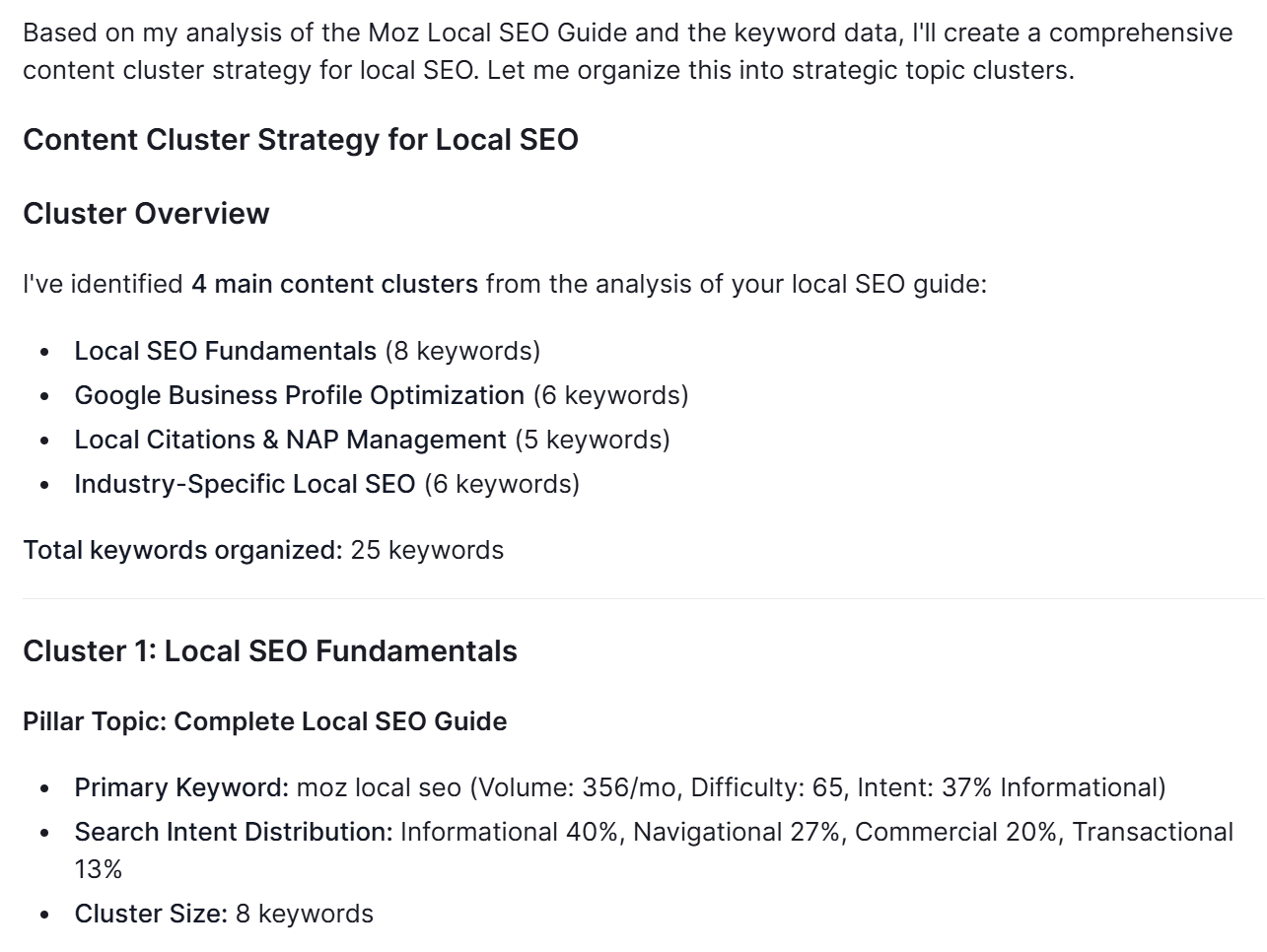
Clara's comprehensive analysis identified a few clusters we could dive deeper into as we create more resources for SMBs about local marketing and SEO.
Benefits: Convert siloed content into highly engrossing and structured ecosystems. With AI Mode and other LLMs getting more powerful, topical depth and authority are no longer optional to survive in an altered SEO landscape.
How to Get Set Up With Moz + Relevance AI Agents
You can either watch this supademo video on how to add the Moz API key to Relevance AI or follow the steps outlined below to use the SEO-powered AI workflows described above:
- Create a Relevance AI Account (if needed). If you don’t have an account, you can sign up for free by clicking this link.
- Find the agents in the Templates gallery or copy the clone links below for each agent:
- Reva, the SEO Content Refresh Strategist (clone link)
- Kira, the SEO Competitor Keyword Analyst (clone link)
- Clara, the SEO Content Cluster Planner (clone link)
- Cora, the SEO Content Intent Optimizer (clone link)
- Linka, the SEO Backlink Prospector (clone link)
- Add the agents to your account: Once it is set up, clicking any of the clone links above will prompt you to add each. Once they have been cloned, you’ll see your agents under the “Workforce” section and their corresponding tools (backend APIs) in the “Tools” section.
- Update Moz API Keys: You will need a Moz API key to tap into the power of these SEO agents, so make sure you sign up for a plan based on your expected usage (e.g., if you plan to run more than 10 tasks per month, our $20/month plan gives you more than enough bandwidth to get started).
- Navigate to “Integrations & API Keys” on the left-hand side of your Relevance AI dashboard.
- Click “Custom API Keys”.
- Click the “Add custom API key” button.
- Add your key name and value: Note that all tools powering your cloned AI agents seek a value called {{secrets.chains_mozapi}}, so it’s important to use the following value for the key name: mozapi
- For “Value,” simply add the API key you’d like to use from your Moz API Dashboard and click save. You can get this value by clicking the “Copy” icon in your Moz account.

And voila! You should be all set to use your brand-new AI-powered SEO workforce.
Power your software with a single source of truth
Get real-time SEO data with Moz API

Why AI Agents Matter for Modern SEO
Rome wasn't built in a day, and neither is a net new marketing strategy. However, we're entering a new era where marketers are unlocking their creativity by building multi-faceted agentic systems. Building AI agents won't just automate busywork and competitive research but will provide an opportunity to elevate strategies further:
- It saves you hours of manual research and analysis and lets you focus your brain power on higher-impact projects.
- Get data-driven, intent-informed recommendations powered by the industry's leading SEO data, complementing your existing SEO tools.
- 10x your productivity and scale content production, fueling data collection and allowing you to A/B test with reduced capacity restraints.
If you're ready to plunge into the world of AI and gain an edge over your competition, test our automated workflows. Whether you're optimizing content, identifying link-building opportunities, or just wanting to get a view of the competitive landscape, you can use ready-made solutions or build your own AI agents to complement existing toolkits.
The future of marketing, not just SEO, is about operating smarter with the tools at your disposal. Harnessing the power of SEO-powered AI agents gets you one step closer to outshining your competition.



![What Is Generative Engine Optimization (GEO) [Tips & Workflows To Do It]](https://cloudz.click/images/blog/banners/What-Is-Generative-Engine-Optimization-Tips-Workflows-To-Do-It-1.png?w=580&h=196&auto=compress%2Cformat&fit=crop&dm=1745607929&s=5e9f8bc064c19ecabcb8b5b64eff324d)